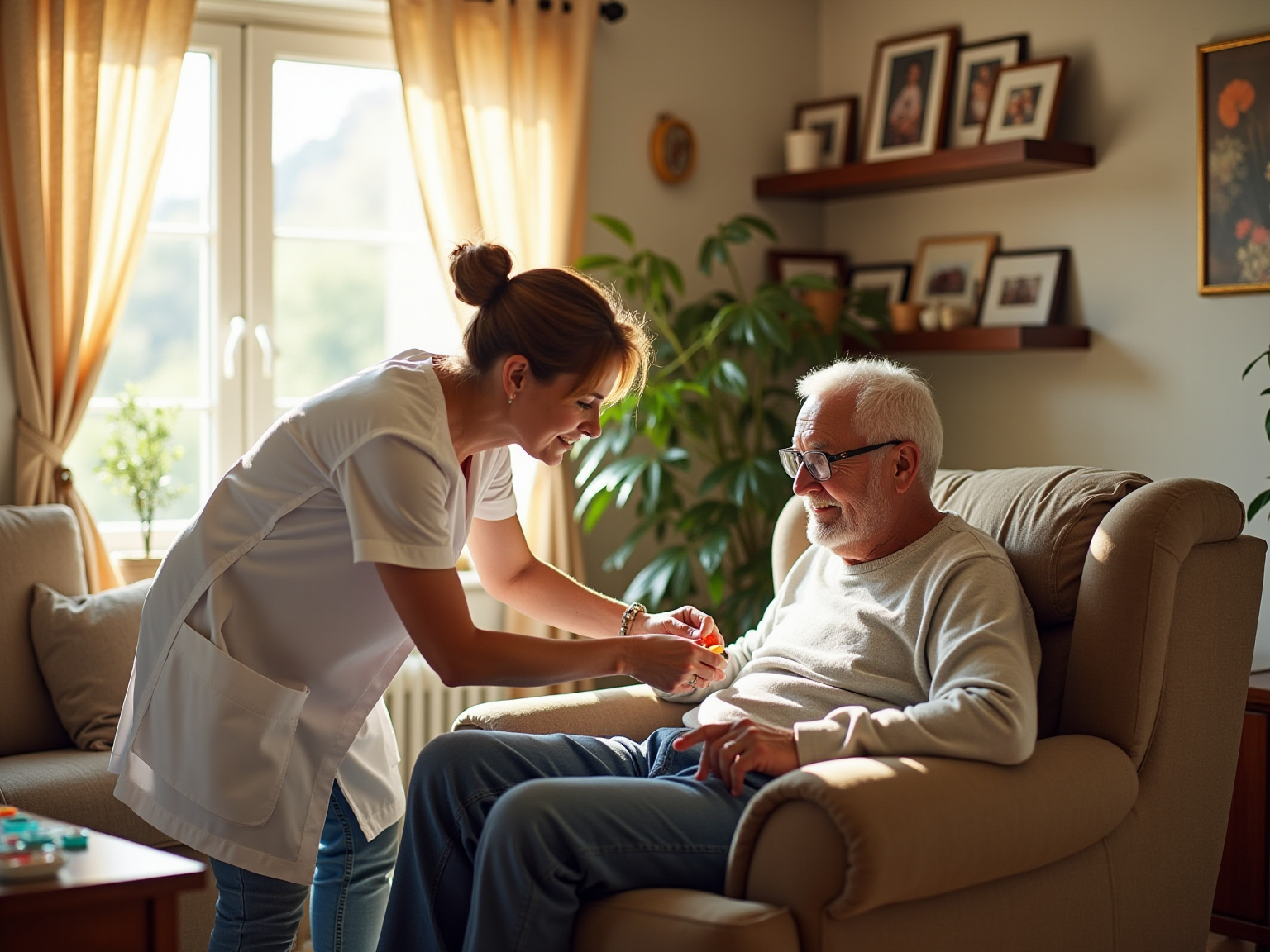Overview
The article titled “10 Essential Nursing Home Services for Quality Care” highlights the vital services that contribute to high-quality care in nursing homes. It recognizes the importance of personalized care plans, companionship, medication management, and physical therapy. These essential services are crucial for enhancing the overall well-being and quality of life for residents. They not only address medical needs but also nurture emotional health, fostering a supportive community environment.
In addition, understanding the emotional and physical needs of residents is at the heart of quality care. By providing tailored support, nursing homes can create a nurturing atmosphere where individuals feel valued and cared for. This compassionate approach is essential for ensuring that every resident can thrive.
As families seek the best for their loved ones, knowing that these services are available can bring peace of mind. We’re here for you, ensuring that your loved ones receive the comfort and attention they deserve. Your comfort is our priority, and together, we can make a difference in their lives.
Introduction
In a world where aging populations increasingly seek comfort and care in familiar surroundings, the demand for personalized in-home nursing services has never been greater. Best Care Nurses Registry is here to support you in this journey, offering tailored care solutions that prioritize the unique needs of each individual. By focusing on comprehensive assessments and customized care plans, we enhance the quality of life for seniors, enabling them to thrive while receiving the necessary support.
As the landscape of healthcare evolves, the significance of building trust between caregivers and clients becomes paramount. It is essential to ensure that both medical and emotional needs are met. This article delves into the multifaceted services provided by Best Care Nurses Registry, highlighting how our compassionate approach and commitment to personalized care are shaping the future of home healthcare. Your comfort is our priority, and we are dedicated to being there for you every step of the way.
Best Care Nurses Registry: Personalized In-Home Nursing Services
At Best Care Nurses Registry, we understand that every individual has unique needs, which is why we offer a comprehensive suite of personalized nursing home services. Our approach begins with thorough evaluations, allowing us to create tailored support strategies that prioritize the comfort and independence of seniors. This personalized method is crucial; research indicates that customized support plans significantly enhance health outcomes for senior patients, enabling them to thrive in familiar surroundings while receiving the necessary assistance.
Building trust and connection between caregivers and clients is at the heart of our philosophy. Our highly trained experts, including registered nurses and licensed practical nurses, provide compassionate support that addresses both medical and emotional needs. By emphasizing adaptability and companionship, we ensure that seniors receive not only medical aid but also emotional support, helping to reduce feelings of isolation and improve overall well-being.
As the demand for home healthcare continues to grow—projected to require 924,000 personal support aides and home health aides by 2031—Best Care is well-equipped to meet this need with our responsive services. This demand reflects a broader trend; while the industry saw only 1% growth from 2008 to 2009, it was projected to increase by 4.2% annually by 2014.
Recent trends underscore the importance of personalized plans, with healthcare professionals advocating for their role in enhancing seniors’ quality of life. Notably, individuals over 85 are the most represented in assisted living facilities, highlighting the urgent need for customized support solutions. Additionally, with 83.5% of home health agencies operating for profit, selecting a trusted provider like Best Care is essential. By focusing on tailored in-home healthcare, we not only alleviate the burden on families but also ensure that seniors receive the highest quality of care, fostering a sense of safety and wellness. Remember, your comfort is our priority, and we’re here for you.
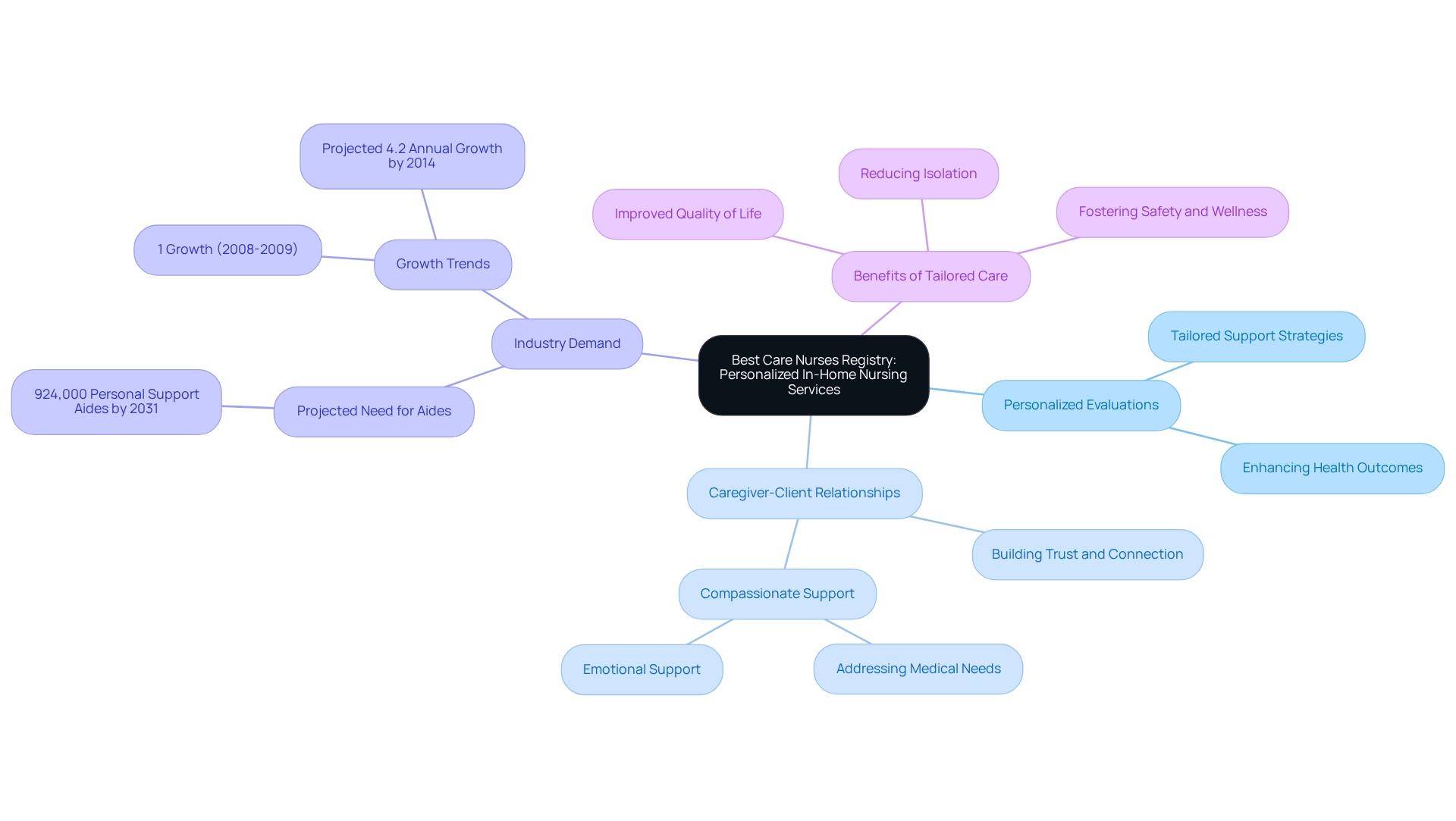
Companionship Services: Enhancing Emotional Well-Being in Nursing Homes
Companionship assistance is essential for enhancing the emotional well-being of nursing home residents. Trained caregivers facilitate social interaction, engage in meaningful conversations, and participate in activities that stimulate mental engagement. Did you know that one in three older adults report a lack of companionship? This can significantly affect their mental health and overall quality of life. An evaluation of 31 suitable studies on loneliness and health further emphasizes the prevalence of loneliness among older adults, underscoring the essential need for companionship support.
Without CNA/HHA caregiver assistance, seniors may face health decline, inadequate nutrition, and increased social isolation, which can exacerbate feelings of loneliness and depression. By prioritizing companionship, care facilities can effectively reduce these feelings, fostering a sense of belonging and community among occupants. This supportive environment not only promotes mental health but also enhances the overall quality of life for seniors, and research has shown that nursing home services that offer social interaction are linked to improved emotional well-being, making companionship options a vital aspect of support. As the demand for such offerings grows, establishments that adopt strong companionship initiatives are likely to see favorable results in occupant satisfaction and mental well-being. Additionally, practical benefits like household management and medication management provide peace of mind for family members, ensuring a safe and organized living environment.
Incorporating nature therapy, which has been advocated for senior well-being, can further enhance mental health, social connections, and quality of life. Best Care Nurses Registry, with its strong reputation built over decades, exemplifies the dedication to offering personalized caregiver matching and quality companionship that supports the emotional well-being of seniors, ensuring they receive the compassionate attention they deserve.
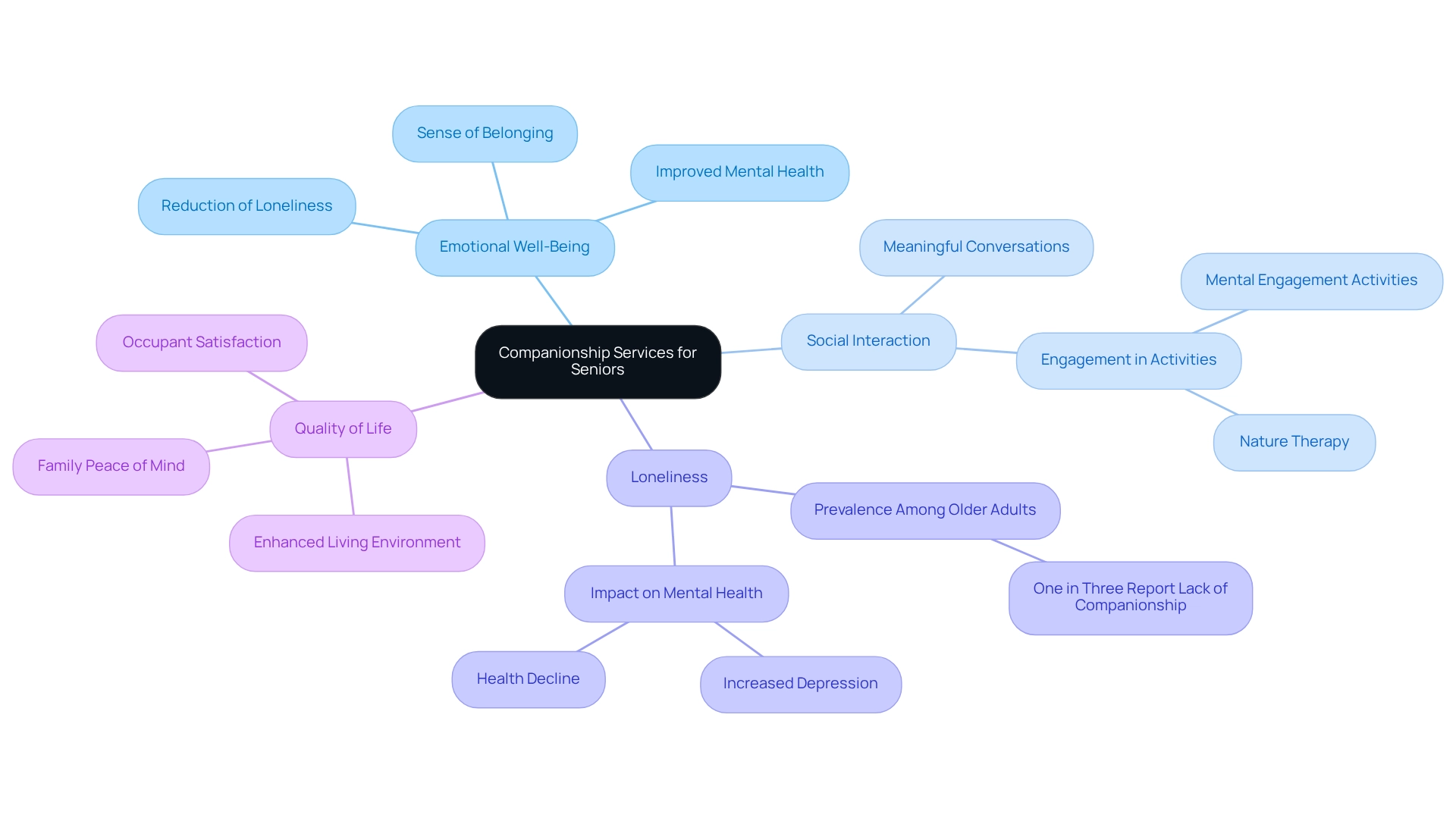
Medication Management: Ensuring Safe and Timely Administration
Effective medication management is essential in care facilities, ensuring that residents receive their medications safely and on time. This service encompasses regular reviews of medication regimens, vigilant monitoring for potential side effects, and seamless coordination with healthcare providers to adjust prescriptions as necessary. By implementing a systematic medication management system, assisted living facilities can greatly reduce the risk of medication mistakes, a common issue in elder support environments. Did you know that medication mistakes can happen in up to 20% of care home inhabitants? This statistic highlights the necessity for strong management practices.
As David Alldred emphasizes, “There needs to be a learning culture in place, so that when errors are reported they can be discussed and solutions found to prevent them.” Personalized approaches are essential, as each patient faces unique challenges that can affect their medication adherence. Tailoring solutions to individual needs not only enhances compliance but also improves overall health outcomes. For instance, effective medication management systems in elder support have shown that tackling particular obstacles—such as cognitive impairments or intricate medication regimens—can lead to improved adherence rates. The case study titled “Tailoring Solutions to Individual Needs” illustrates that by treating patients as individuals and addressing their specific obstacles, providers can enhance adherence and improve health outcomes.
Recent advancements in medication management emphasize the importance of a learning culture within healthcare settings. This involves creating an environment where errors can be openly discussed and solutions developed to prevent future occurrences. Healthcare providers should approach each patient without preconceived notions, coming prepared with resources to address barriers to adherence. By prioritizing medication safety, nursing home services can ensure that their residents receive the highest standard of assistance, ultimately fostering a safer and more supportive living environment for seniors.
At Best Care Nurses Registry, we recognize that individualized planning is crucial for efficient medication management. Our customized caregiver pairing service guarantees empathetic support designed for your unique requirements. To explore individualized support planning and locate the suitable provider for your needs, call (888) 203-2529 to converse with our welcoming team. We are here for you, ready to help you create a tailored home health care solution that meets your unique needs.
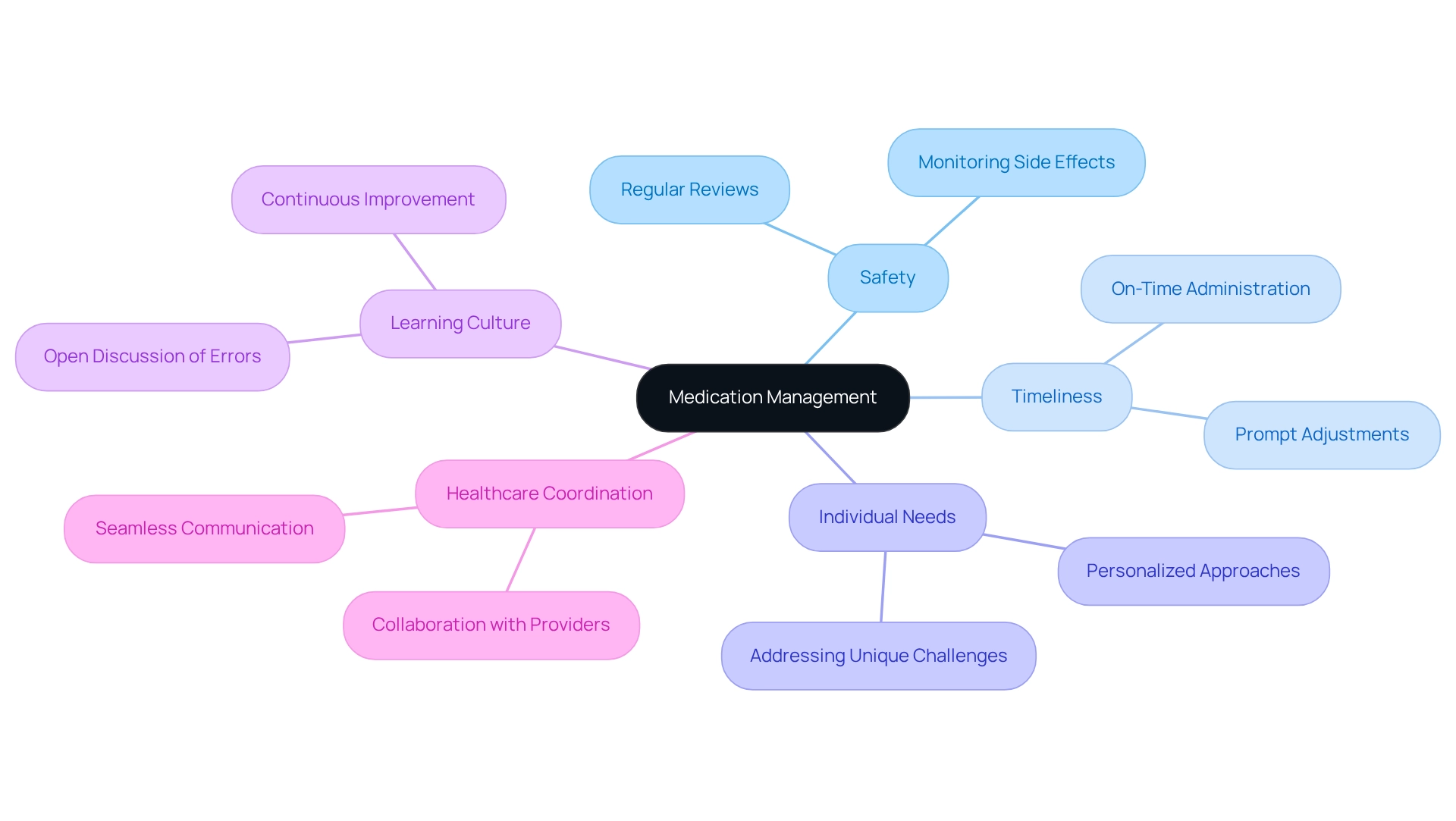
Physical Therapy Services: Supporting Rehabilitation and Mobility
Nursing home services that include physical therapy offerings are vital in supporting residents’ rehabilitation and mobility goals. Skilled therapists work closely with individuals to develop personalized exercise programs that enhance strength, balance, and coordination. These tailored programs are particularly beneficial for seniors recovering from surgery or managing chronic conditions affecting their mobility.
Research shows that nearly 1 in 4 older adults seeking rehabilitation in the U.S. healthcare system are frail, underscoring the importance of targeted rehabilitation services. Unfortunately, many frail older adults encounter significant barriers to accessing necessary care, such as transportation challenges and restrictive insurance policies. These obstacles can impede their participation in effective physical therapy, ultimately impacting their rehabilitation outcomes.
Effective rehabilitation programs in care facilities not only aim to restore physical abilities but also highlight the importance of preserving independence. For instance, case studies reveal that individuals who engage in consistent physical therapy experience improved mobility and overall health, leading to a better quality of life.
Experts emphasize the essential role of physical therapy in rehabilitation within nursing home services. A physical therapist shared, “Personalized exercise regimens can lead to substantial improvements in mobility for elderly patients.” By addressing the unique needs of older adults, care facilities can foster an environment that encourages recovery and well-being, enabling residents to regain their independence and enhance their physical health.
We understand that navigating these challenges can be overwhelming. We’re here for you, ready to support your journey towards improved mobility and health. Your comfort is our priority, and together, we can make a meaningful difference in your rehabilitation experience.
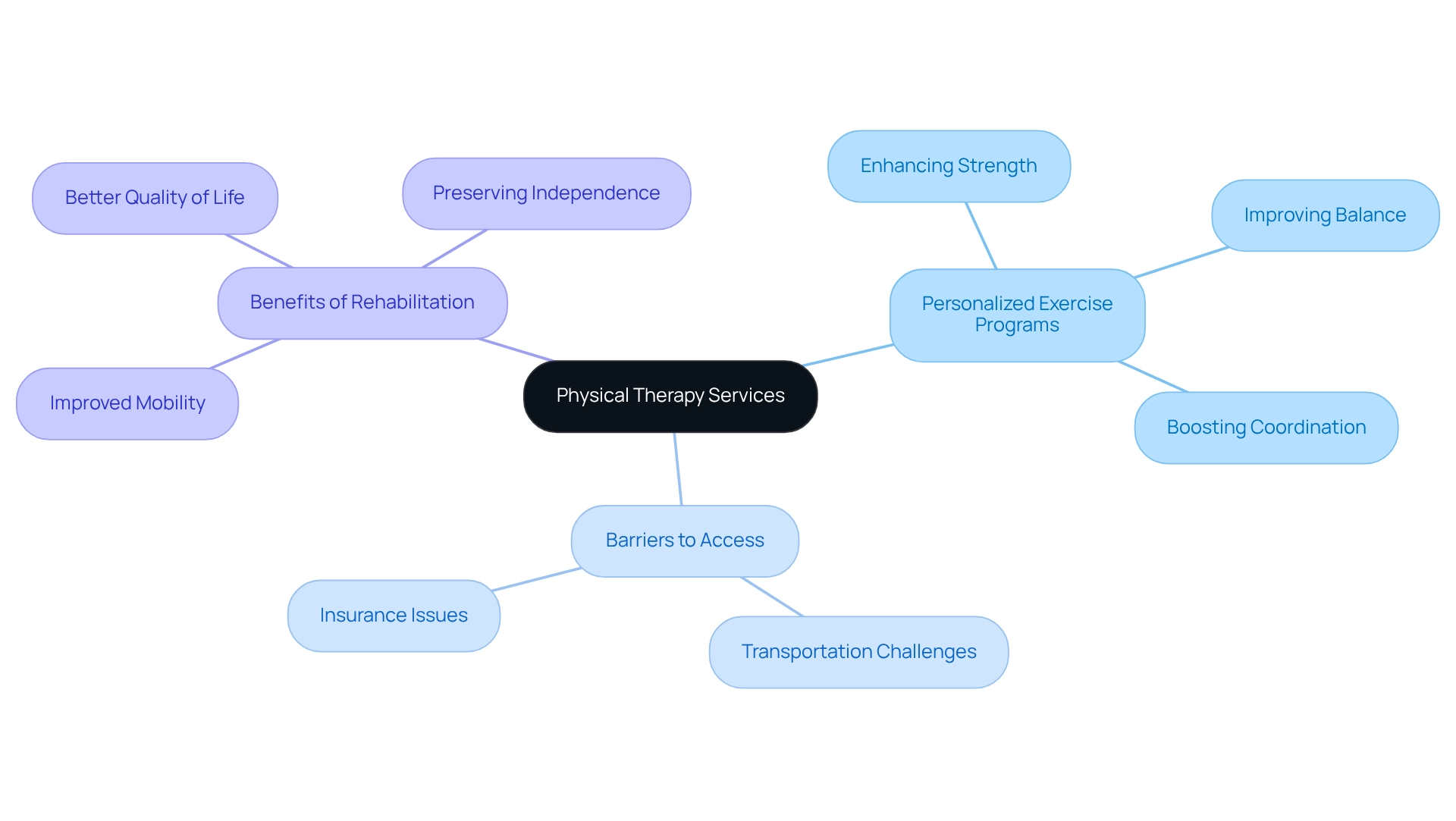
Skilled Nursing Care: Addressing Complex Medical Needs
Expert medical support is a vital component of high-quality nursing home services, particularly for residents with complex health needs. At Best Care Nurses Registry, our compassionate registered nurses (RNs) and licensed practical nurses (LPNs) provide ongoing support, including essential services such as wound management, IV therapy, and vital sign monitoring. This comprehensive approach is crucial for individuals dealing with chronic illnesses or those recovering from significant health challenges, ensuring they receive the necessary medical attention to maintain their health and overall well-being.
Home health services provided by our skilled medical professionals are not only cost-effective and convenient but also equally effective as nursing home services or treatment received in a hospital. Many elderly individuals require specialized medical support, often facing multiple chronic ailments that complicate their treatment. By 2025, the demand for skilled health assistance is expected to rise significantly, driven by an aging population and an increasing prevalence of complex medical conditions.
In addition, the expiration of the TNA waiver in 2022 has raised concerns among nursing home operators, highlighting the urgent need for nursing home services to effectively manage these complexities. Continuous support is essential, as round-the-clock monitoring and timely interventions can dramatically improve health outcomes for seniors. As Mark Parkinson, CEO of AHCA/NCAL, expressed, “Value-based services through the population health management model is the most exciting thing I’ve had the chance to be a part of in my 30 years in the industry.” This perspective underscores the importance of proficient medical support in adapting to evolving treatment frameworks that prioritize patient outcomes.
At Best Care Nurses Registry, we prioritize personalized care planning, ensuring that each individual receives tailored attention that addresses their unique health needs. The nursing home services provided by our dedicated healthcare experts are designed to meet the diverse requirements of residents, fostering a nurturing environment that enhances the quality of life for seniors. Effective management of complex medical needs relies on the expertise of our skilled care team, who play a crucial role in addressing the challenges associated with chronic conditions and promoting optimal health outcomes. A recent case study on value-based treatment illustrates how our dedicated support can adapt to these challenges, showcasing the potential for improved health outcomes through committed assistance.
For more information or to discuss your specific needs, we’re here for you. Call us at (888) 203-2529.
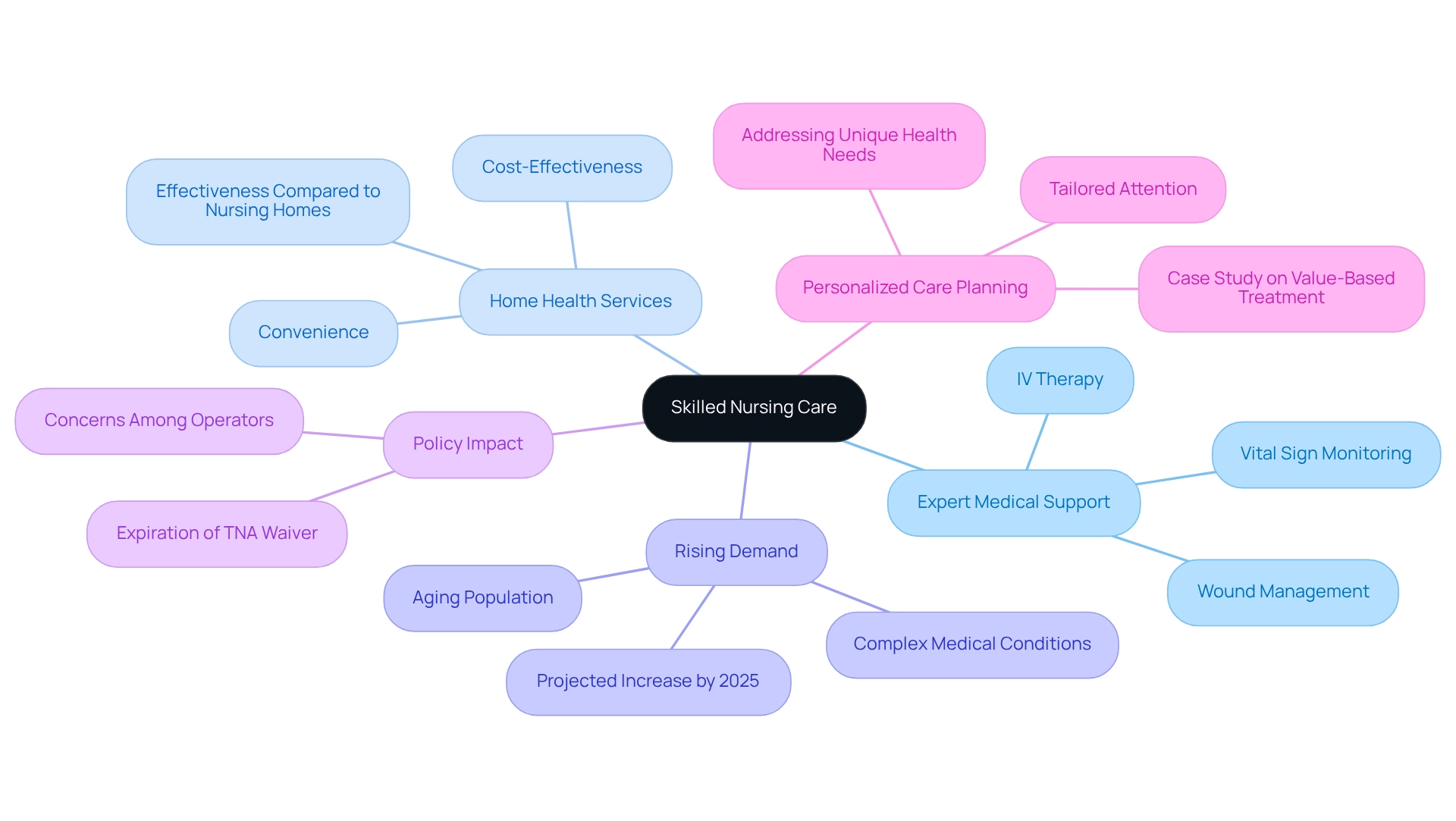
Personal Care Services: Assisting with Daily Living Activities
Personal care support in nursing home services is crucial for assisting individuals with daily living tasks, such as bathing, dressing, grooming, and eating. These nursing home services are thoughtfully tailored to meet the unique needs of each individual, ensuring that dignity and independence are preserved. Caregivers, including Certified Nursing Assistants (CNA) and Home Health Aides (HHA), provide compassionate support that is vital for maintaining personal hygiene and overall well-being, directly influencing individuals’ self-esteem and quality of life.
The importance of dignity in personal assistance cannot be overstated. With the senior population on the rise—approximately 1.3 million individuals residing in nursing home services as of 2020—the demand for personalized support is more pressing than ever. Successful personal care programs have demonstrated the ability to enhance dignity for seniors, fostering an environment where they feel respected and valued.
Expert opinions emphasize that these services extend beyond mere physical assistance; they also promote emotional well-being. Caregivers often share how significantly they impact individuals’ lives, expressing that their role goes beyond tasks to include building connections that enhance self-esteem. As Mark Twain wisely noted, “Age is an issue of mind over matter. If you don’t mind, it doesn’t matter,” highlighting the emotional dimension of care.
Statistics reveal that personal support needs are a primary concern for residents of assisted living facilities, with many requiring help to maintain their daily activities. Additionally, research indicates that nature therapy can improve mental health, social interactions, and overall quality of life for older adults, suggesting that personal support can incorporate elements that enhance mental well-being. By prioritizing individualized care services, care facilities can significantly improve the quality of life for their residents, empowering them to uphold a sense of independence and dignity as they navigate the challenges of aging.
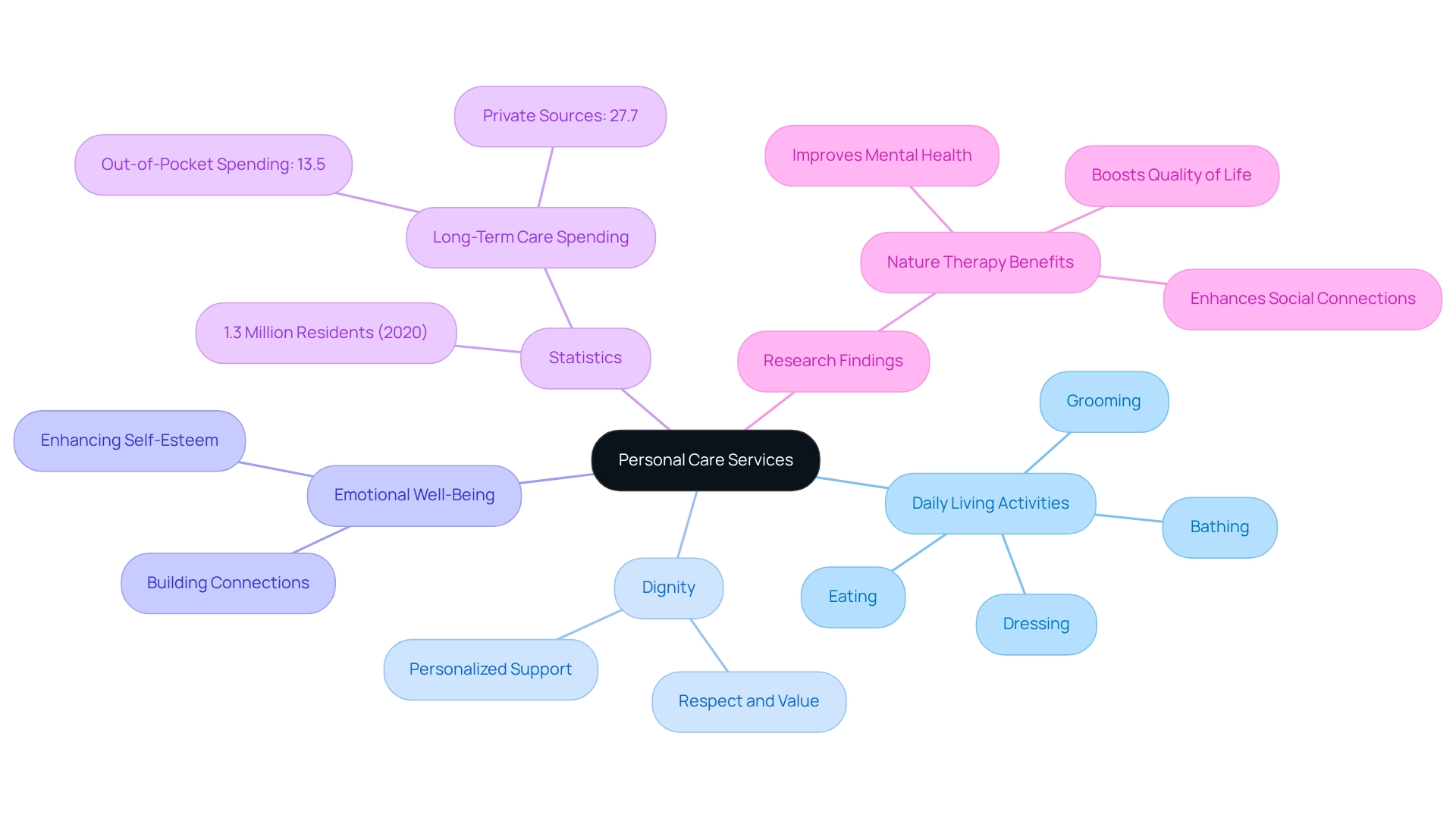
Social Activities: Fostering Community and Engagement
Social activities provided by nursing home services are vital for nurturing a sense of community and involvement among individuals. These engaging options—such as group games, arts and crafts, music therapy, and outings—are thoughtfully designed to encourage participation and foster meaningful interactions. When individuals take part in social events, they not only form friendships but also significantly alleviate feelings of loneliness, which is essential for enhancing overall mental well-being.
Research shows that active participation in social activities can lead to improved cognitive function in older adults. For example, seniors who regularly engage in social interactions are less likely to experience cognitive decline. Studies indicate that such engagement may even reduce the risk of developing conditions like dementia. In fact, the potential savings of approximately $500,000 in lifetime health care expenses per person who might otherwise develop dementia underscore the financial benefits of promoting social engagement. Additionally, social involvement is linked to better mental health outcomes, as it fosters a sense of belonging and purpose among community members.
Effective community involvement initiatives in nursing home services highlight the positive impact of social activities. These programs often include tailored events that resonate with the interests of community members, encouraging not just participation but also joy and fulfillment. As Tia Walker poignantly states, “Caregiving often calls us to lean into love we didn’t know was possible,” reminding us of the profound emotional connections that social interactions can create. By prioritizing social activities, nursing home services can create an environment that enhances the emotional and cognitive well-being of their residents, ultimately leading to an improved quality of life.
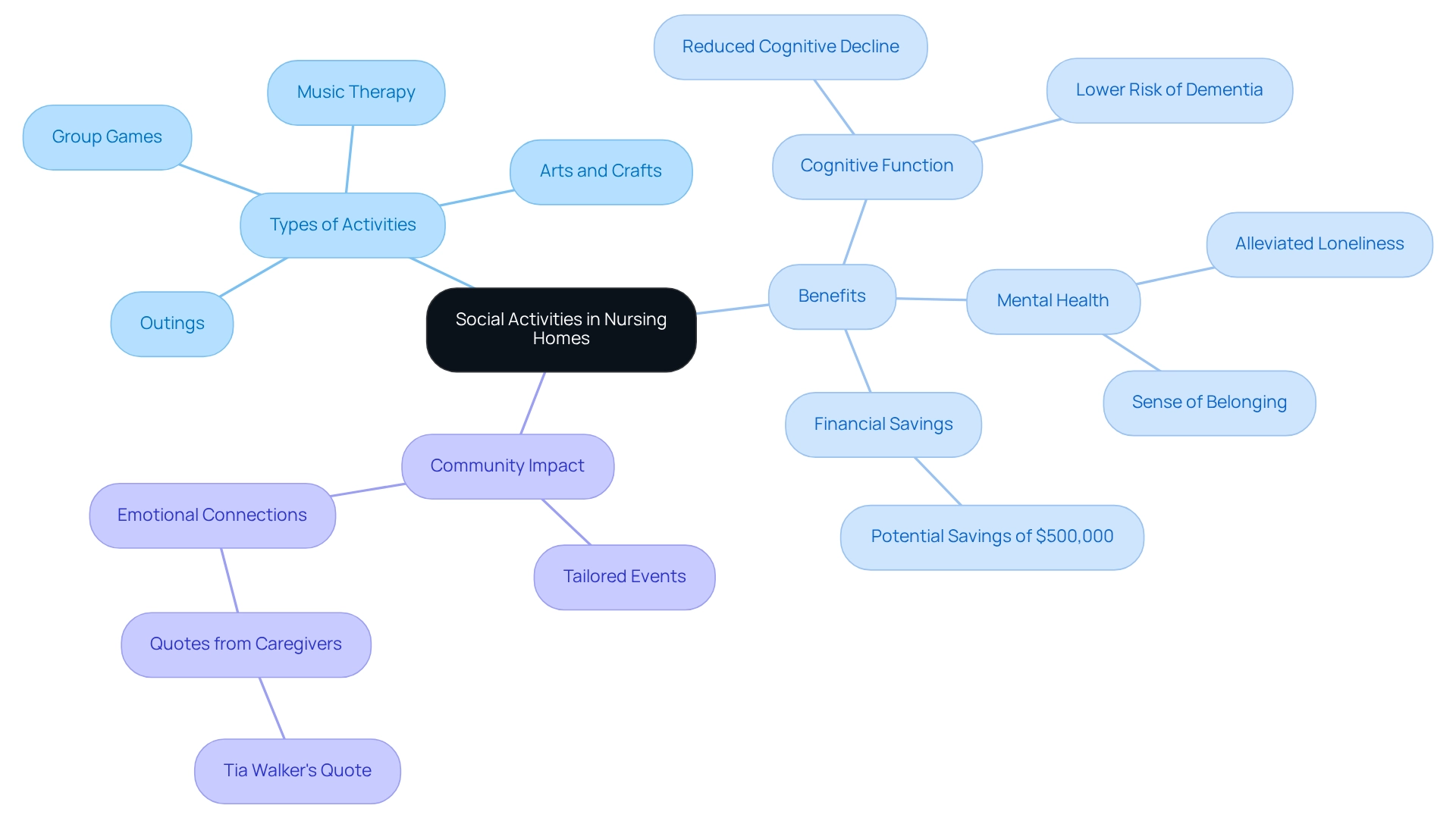
Dietary Services: Meeting Nutritional Needs of Residents
Dietary assistance in nursing home services plays a crucial role in meeting the nutritional requirements of residents, greatly impacting their health results. These nursing home services include tailored meal planning that considers individual dietary restrictions, preferences, and specific health conditions. By providing balanced and nutritious meals, care facilities can effectively combat malnutrition and improve the overall well-being of their residents.
After surgery, it’s common for seniors to feel discomfort and fatigue, making adequate nutrition even more essential. A nutritious diet is vital for healing. Nursing homes should focus on providing meals rich in fruits, vegetables, lean proteins, and whole grains. Staying hydrated and avoiding alcohol and smoking are also crucial, as these factors can impede recovery. If individuals experience nausea or appetite loss, smaller, more frequent meals may be advantageous. Seeking advice from healthcare providers for additional guidance is recommended.
Regular evaluations of dietary needs are crucial, ensuring that each individual receives the suitable nutrition required to maintain their strength and vitality. For example, the INRx assessment process consists of six elements and ongoing evaluations that permit modifications to support plans, thus continuously enhancing the nutritional assistance for individuals. This proactive strategy guarantees that the changing dietary requirements of seniors receiving nursing home services are fulfilled, ultimately enhancing their health and quality of life. Statistics show that a considerable proportion of older individuals in nursing home services encounter nutritional difficulties, making it essential for facilities to establish efficient dietary programs. Effective meal planning initiatives that accommodate seniors with dietary limitations not only encourage improved health results but also boost enjoyment and involvement with their meals. Expert views highlight the significance of nutritional support in elderly care, stressing that properly organized nutrition is essential for preserving health and avoiding complications.
Family members should remain alert for warning signs of malnutrition and dehydration in care home inhabitants. Look for signs such as unexplained weight loss, muscle weakness, confusion, dry skin, and ongoing fatigue. Recognizing the input of Dorothee Volkert and Doris Eglseer for their recommendations on the study protocol design further enhances the credibility of the discussion regarding dietary provisions and their effect on health outcomes.
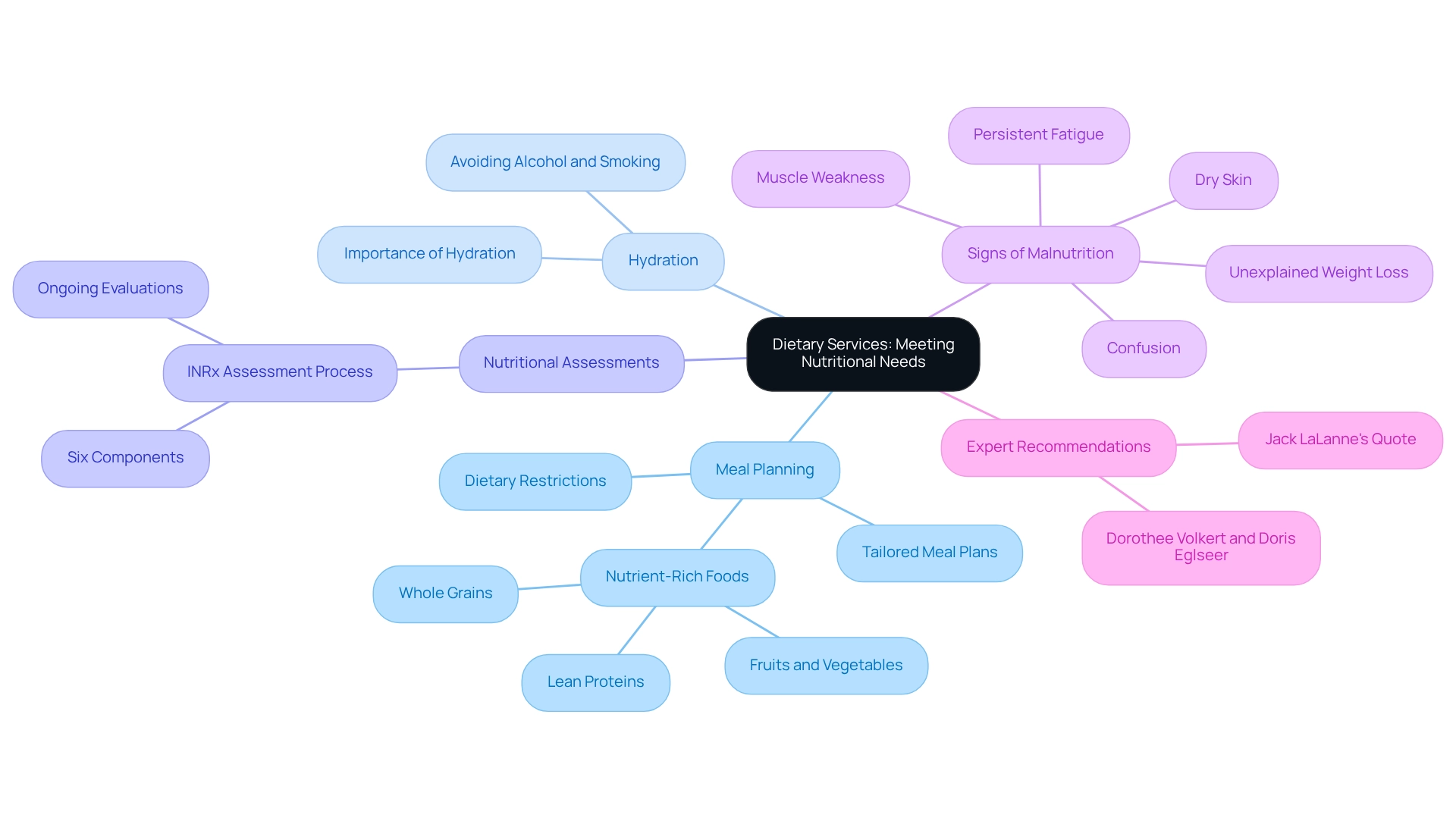
Transportation Services: Facilitating Access to Care and Activities
Transport options in care facilities are vital for ensuring that individuals can reach medical appointments, participate in social activities, and connect with community events. With around 11 million older adults in the U.S. unable to drive, the demand for reliable transportation options has never been more urgent. This need is particularly pressing for seniors from racial and ethnic minorities, who may encounter additional barriers to mobility.
By providing safe and accessible transportation, nursing home services empower residents to maintain their independence and remain connected to their communities. This not only enhances their quality of life but also facilitates prompt medical attention, which is crucial for managing health conditions. Effective transportation programs can significantly alleviate the emotional and physical burden on seniors, allowing them to concentrate on their well-being instead of logistical hurdles.
Expert perspectives underscore the importance of these resources, with social workers emphasizing that enabling access to support is essential for fostering elderly independence. Jason R. Falvey notes, “With increasing investment in public infrastructure on the horizon, centering the unique medical, economic, and social needs of older transit users is critical to ensure urban communities remain age-friendly.” Furthermore, successful transportation initiatives have been shown to lead to improved health outcomes and heightened community satisfaction. As the landscape of elderly assistance evolves, prioritizing transportation options will remain crucial for cultivating a supportive environment for seniors.
To enhance transportation choices for family members, relatives can engage with care facility administrators to discuss the development of comprehensive transport programs that address the specific needs of residents.
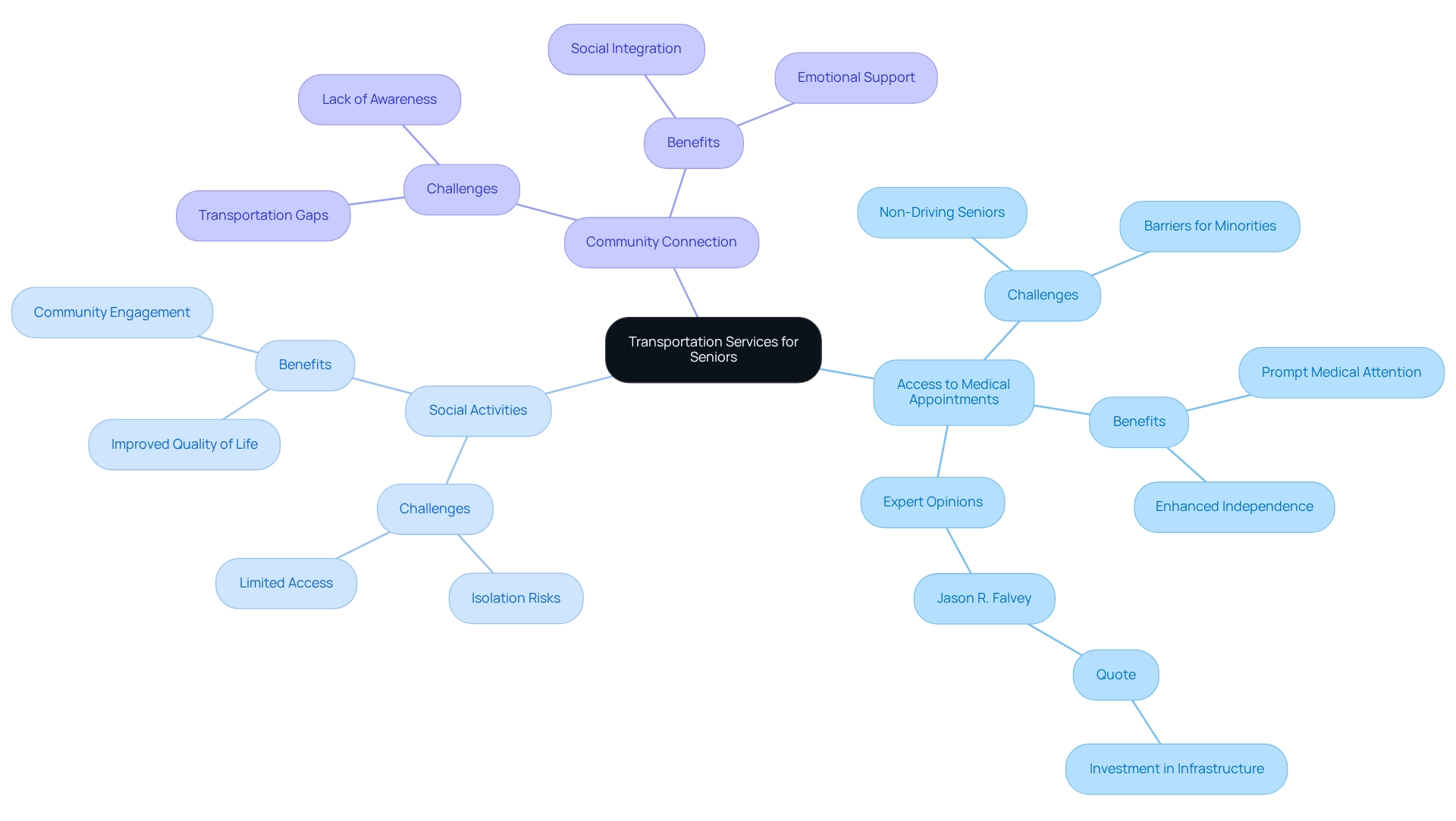
Family Support Services: Keeping Families Informed and Involved
Family assistance programs within nursing home services are vital in keeping families informed and engaged in their loved ones’ well-being. These offerings include:
- Routine health updates
- Planned family gatherings
- Educational materials that help family members navigate the process
Research shows that when families are involved, the emotional support provided to individuals significantly enhances, leading to an improved overall quality of life. Additionally, studies reveal that most Americans prefer home or community-centered care, highlighting a growing demand for options that emphasize family participation. This trend underscores the need for care facilities to implement robust family support systems.
By promoting open dialogue and encouraging family involvement, nursing home services can create a more supportive atmosphere that not only benefits residents but also alleviates the emotional burden on families. The impact of family support services within nursing home services extends beyond mere communication; they are essential for enhancing the well-being of those living in the facility.
Experts emphasize that when families are engaged in nursing home services, the quality of support improves, leading to greater satisfaction for residents. Pillemer et al. noted that staff were less likely to resign during the intervention, suggesting that consistent staffing leads to better outcomes. Effective communication strategies, such as regular updates and inclusive gatherings, enable families to engage meaningfully in nursing home services, thereby strengthening the connection between family involvement and positive health results.
Best Care Nurses Registry exemplifies this commitment to family assistance by offering tailored support consultations and compassionate nursing home services for caregiver pairing. By involving families in the planning process and ensuring caregivers are well-matched to meet individual needs, Best Care enhances the overall experience of nursing home services. Furthermore, they assist families with long-term support insurance claims, ensuring they maximize their benefits while receiving the necessary assistance. This approach not only enriches the experience for residents but also reinforces the family’s role in the support process.
Don’t just take our word for it—hear from our satisfied clients who have witnessed the positive impact Best Care Nurses Registry has had on their loved ones’ lives. Contact us today at (888) 203-2529 to discover how we can support your family with personalized home health care solutions.
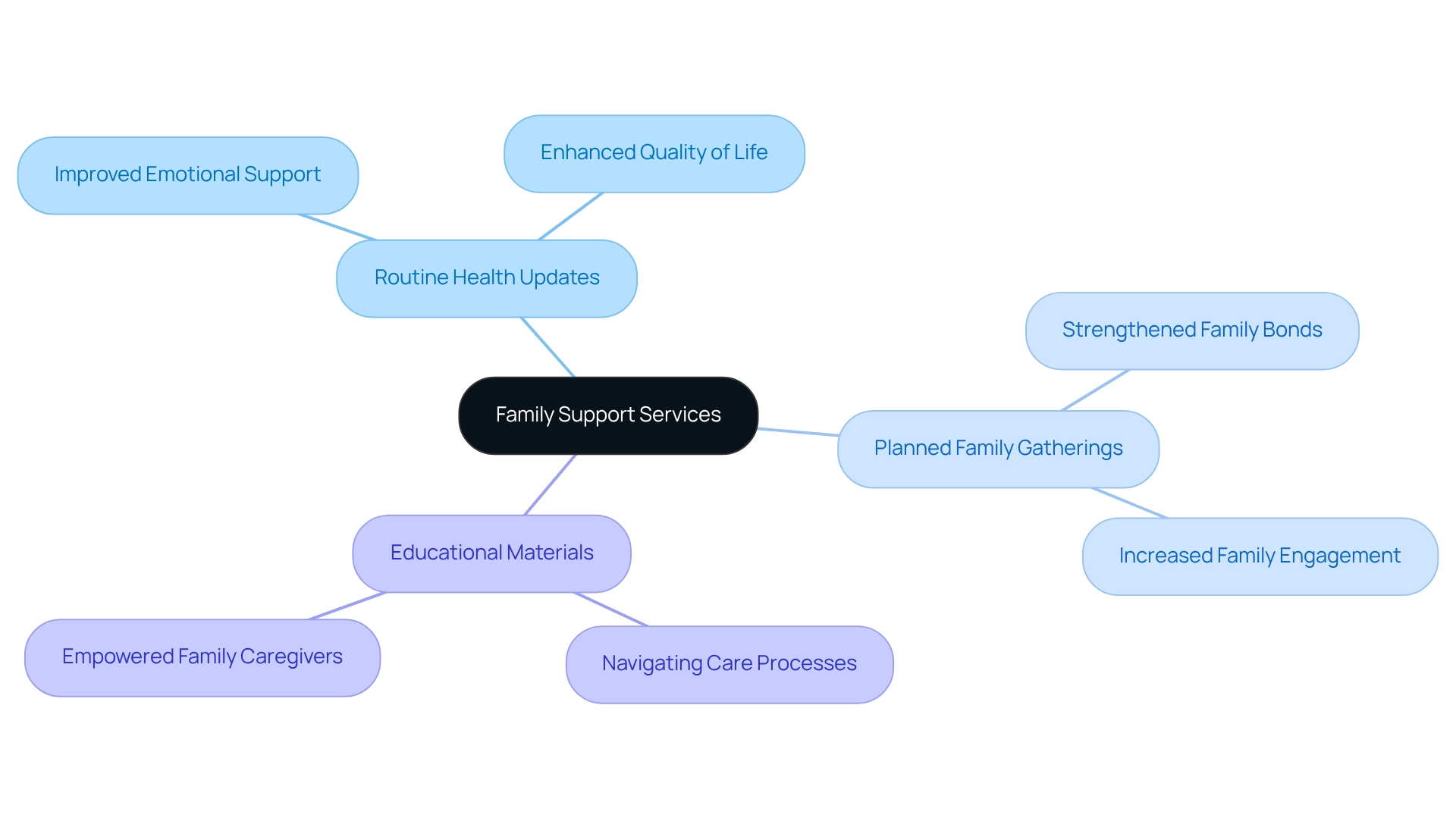
Conclusion
Personalized in-home nursing services are essential for enhancing the quality of life for seniors, allowing them to receive care in the comfort of their own homes. At Best Care Nurses Registry, we stand at the forefront of this movement, offering tailored care solutions that address the unique medical and emotional needs of each individual. From comprehensive assessments to customized care plans, our focus remains on fostering independence and trust between caregivers and clients.
The multifaceted services we provide, including medication management, physical therapy, companionship, and family support, demonstrate our commitment to holistic care. These services not only improve health outcomes but also combat feelings of loneliness and isolation among seniors. By prioritizing emotional well-being alongside physical health, we ensure that residents receive not only medical assistance but also companionship and community engagement.
As the demand for personalized home healthcare continues to rise, the importance of choosing a trusted provider cannot be overstated. Best Care Nurses Registry exemplifies this trust with a compassionate approach that prioritizes the dignity and autonomy of each client. By embracing a model of care that values individual needs, we are not just meeting the requirements of today’s healthcare landscape; we are shaping the future of elder care. The journey towards enhanced well-being begins with personalized care, and we are dedicated to guiding families every step of the way.
Frequently Asked Questions
What types of services does Best Care Nurses Registry offer?
Best Care Nurses Registry offers a comprehensive suite of personalized nursing home services, including tailored support strategies, companionship assistance, and effective medication management.
How does Best Care ensure personalized care for seniors?
Best Care begins with thorough evaluations to create customized support plans that prioritize the comfort and independence of seniors, enhancing their health outcomes.
Why is companionship important for nursing home residents?
Companionship is essential for enhancing the emotional well-being of nursing home residents, as it helps reduce feelings of loneliness and promotes social interaction, which is linked to improved mental health.
What is the projected demand for home healthcare services?
The demand for home healthcare is projected to require 924,000 personal support aides and home health aides by 2031, reflecting a growing need for such services.
What role does medication management play in care facilities?
Effective medication management ensures that residents receive their medications safely and on time, reducing the risk of medication mistakes and improving health outcomes through tailored approaches.
How does Best Care address medication management challenges?
Best Care implements a systematic medication management system, conducts regular reviews, monitors for side effects, and coordinates with healthcare providers to adjust prescriptions as necessary.
What is the significance of individualized planning in medication management?
Individualized planning is crucial for efficient medication management as it addresses unique challenges faced by each patient, enhancing compliance and overall health outcomes.
How does Best Care support emotional well-being in seniors?
Best Care supports emotional well-being by providing compassionate caregivers who facilitate social interaction, engage in meaningful conversations, and create a supportive environment for seniors.
What should families do to find suitable home health care solutions?
Families can explore individualized support planning by contacting Best Care Nurses Registry at (888) 203-2529 to discuss tailored home health care solutions that meet their unique needs.





